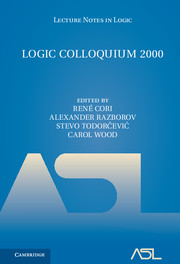Introduction
Published online by Cambridge University Press: 27 June 2017
Summary
Logic Colloquium 2000, the EuropeanMeeting of the Association for Symbolic Logic, took place in La Sorbonne, Paris, France, on July 23–31, 2000, on the site of Hilbert's presentation of his famous list of problems in the summer of 1900. LC2000 was part of World Mathematical Year 2000 and was organized to have a special impact on the future of logic, in recognition of the new millennium. The main themes of the meeting were: Proof theory and logical foundations of computer science, Set theory, Model theory, Computability and complexity theory, History of 20th century logic, Philosophy and applications of logic to cognitive sciences. The tutorials, philosophy symposium, historical talks and certain other lectures also comprised the European Logic Summer School 2000, emphasizing the importance of the training of young researchers in logic.
The Program Committee consisted of D. Andler, C. Berline, B. Cooper, D. van Dalen, A. Kanamori, C. Parsons, A. Razborov, H. Schwichtenberg, J. Steel, S. Todorčević, A.Wilkie, andC.Wood (Chair). The Local Organizing Committee included C. Berline, Z. Chatzidakis, R. Cori (Chair), M. Dickmann, J. Dubucs, J.-B. Joinet, D. Lascar, Y. Legrandgérard, J. Mosconi, M.-H.Mourgues, C.Muhlrad-Greif, L.Pacholski, J.-P.Ressayre, B.Veličković, and F. Ville. The programconsisted of 4 tutorials and 24 invited plenary talks. There were also over 200 contributed papers, presented during 11 blocks of time, each block having 7 parallel sessions. A few papers were presented by title only.
This Logic Colloquium was certainly the largest in recent memory, with 426 registered participants from 52 countries. Through grants from the ASL, the European Community, the French and theUS governments, financial support was provided to 98 participants,many of themjunior researchers and students attending their first international meeting.
The following tutorials were given, and all but the first of these are included in the volume:
Lenore Blumand Stephen Smale (CarnegieMellon University, Pittsburgh), Complexity and real computation.
Elisabeth Bouscaren (Université Paris 7 – CNRS), Model theory and geometry.
John Longley (University of Edinburgh), Realizability and higher-type computability.
W. Hugh Woodin (University of California, Berkeley), The continuum hypothesis.
The following invited plenary talks were presented: Peter Aczel (University of Manchester), Can ZF classical mathematics be understood from a constructive standpoint? Sam Buss (University of California, San Diego), Definability and complexity in bounded arithmetic. MartinDavis (New York University), Computability theory in the twentieth century. Ilijas Farah (Rutgers University), Continuous liftings.
- Type
- Chapter
- Information
- Logic Colloquium 2000 , pp. v - viiiPublisher: Cambridge University PressPrint publication year: 2005



